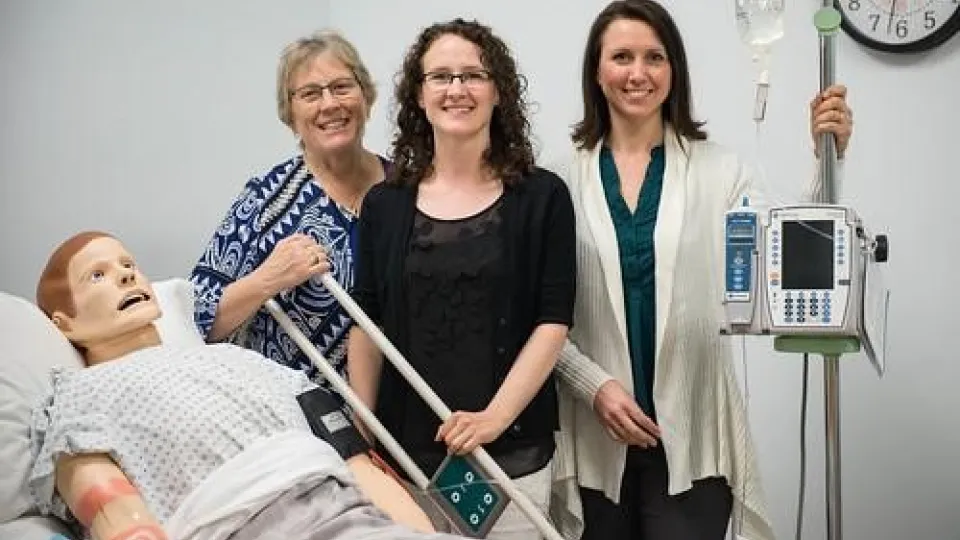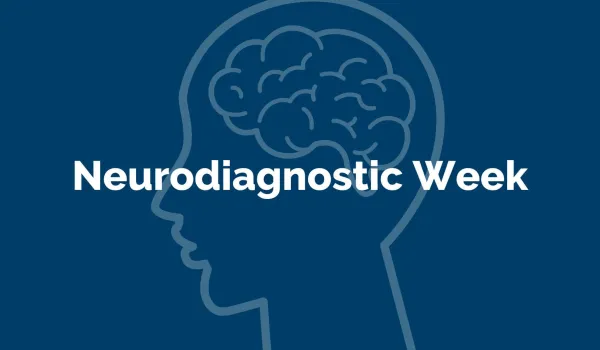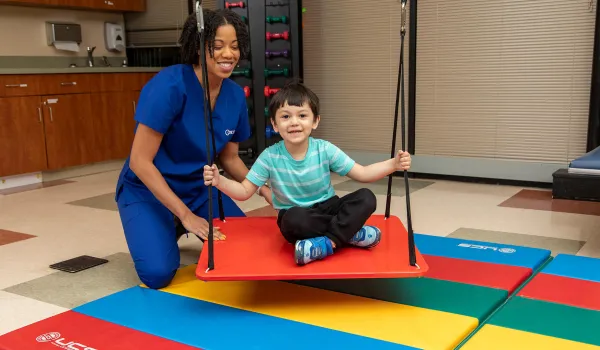Concorde Staff

School is a place where you can explore your calling to help others who are in need. Nurses play a vital role in the health care industry by working with physicians and patients in a variety of health care settings. It's a challenging job, but if you enjoy working in the unique environment of health care, you'll find lots of job satisfaction.
Becoming a nurse requires both schoolwork and hands-on experience in controlled environments before you can work with live patients. One of the most important sections of your nursing education is the clinicals where you will have the opportunity to perform the techniques and skills you learned about in the classroom. Passing your clinicals is key to becoming a nurse and beginning your career. Here's a look at how to prepare for this important part of your schooling.
What Are Nursing Labs?
Nursing labs provide a realistic simulation of a patient care setting. It's normal for nursing students to feel overwhelmed during their labs at the beginning, only to find confidence in their abilities toward the end. Labs allow nursing students to apply their skills in a controlled environment prior to working with actual patients.
Nursing students interact with fellow medical professionals in order to assess, evaluate, and react accordingly to the scenarios that they have been presented with. Students work in a setting that looks and feels like an emergency room, hospital setting, or clinic and apply their training on mannequins that look and act like live patients.
Some of the tasks you might perform in the lab include:
- Taking and monitoring blood pressure
- Drawing blood
- Catheterization
- Intramuscular injections
- Wound care
- Oxygenation therapy
- Performing a full-body assessment
Nursing labs prepare you to use your skills in a real-life setting by providing a safe yet realistic setting for you to practice what you've learned. You and your fellow students are introduced to the scene then allowed to respond and react to the mannequin accordingly.
Depending on your role, you may find yourself inserting an IV, assessing a patient with an injury or illness, calling out or recording vital information, or assisting in a resuscitation. Trained educators observe how you and others react to the situation, watch the steps that you take, and make an evaluation based on how everyone responded to the scenario.
How to Succeed in Skills Labs
Skills labs are your opportunity to show your instructors that you've paid attention to their instructions and can apply them appropriately in a real-life setting, no matter how stressful it may be. But you don't want to throw yourself into the labs and hope for the best - that's the quickest way to fail. Instead of taking chances, prepare to do your best and show that you can succeed at nursing. Here are some tips to help you do your best during skills labs.
Step 1: Dress like a nurse. Dressing the part helps you own the fact that you are becoming a nurse and that you proudly wear your uniform in your quest to help your patients stay healthy.
Step 2: Make valuable use of your time in the skills lab. The unstructured environment of the skills lab may entice you to step back and let someone else perform a function that you're still unsure about. Avoid the temptation to take a back seat. Instead, engage yourself in the lab. The reason for the skills labs is to help you uncover your strengths and weaknesses, so you'll be able to improve your strengths while you also work on improving your weaknesses.
Step 3: Bring your materials and notebook to the lab. You're going to want to take notes from the instructor, and your notebook is the most portable note-taking tool you have.
Step 4: Ask questions. There is truly no such thing as a dumb question, even in the clinical skills lab. Don't let fear of embarrassment prevent you from opening your mouth and asking a question to help you understand what the instructor is demonstrating. Your job is to learn and you won't learn well if you don't have a thorough comprehension of what's being taught.
What Are Clinicals?
Clinicals are opportunities to apply the skills you learned in the skills labs and classroom. This is the point in your education where you start shadowing a nurse and working with live patients in a clinical setting. At first, you assist the nurse with small tasks. Eventually, you may provide patient care under the supervision of the nurse. By the time the term ends, a nursing student might end up working more independently of their supervisory nurse, than in the beginning . This independence helps you understand what it's like to work as a nurse and to perform your duties while using your own judgment.
A clinical rotation can happen in any type of medical facility, but most nursing students begin in a facility that offers care that aligns with their chosen area of specialization if they've chosen one. For example, a nursing student begins their clinical rotation in a nursing home to learn how to work with patients who are used to being cared for by medical staff. The student will assist the residents with their daily needs, taking vital signs at regular intervals, feeding, bathing, helping them move around the facility, and dressing/undressing.
Schools have their own internal grading system for the clinical portion, but they tend to determine a grade based on:
- Attendance
- Homework
- Participation
- Preparedness
How well you perform in these areas ultimately affects your grade. It's important to perform to the best of your abilities in order to earn a passing grade.
How to Prepare for Clinicals
The clinical part of your education is what helps you get a feel for working in a real-life setting, using your own judgment, exercising your skills, and working independently. It's a stressful time, and preparation is key to success. Here's how to prepare for your clinicals and succeed:
Pack Your Essentials
Your essentials are the things you need on a daily basis to help you do your job. That includes wearing scrubs that can hold all of your tools of the trade. Those tools include:
- Watch
- Pen or pencil
- Notepad
- Stethoscope
Keep these items with you at all times and you'll be ready to take down information at a moment's notice as well as collect vital information from a patient. Also, make use of apps that can quickly record your notes or other information that's relevant to your task at hand.
Rely on the Chart
A patient's chart details information that you need to know when interacting with them. Learn how the chart is laid out, review and understand the essential information laid out on the chart and use the chart as a road map for success. Familiarizing yourself with the chart and learning where key information is located helps you become efficient and effective at assessing the details of a patient's needs and health status.
Review the Details
Always look up medications that are unfamiliar to you. The more you know about medications and their interactions or contraindications, the more effective you can be as a nurse. Review your knowledge about medical procedures that you encounter or become a part of. Become familiar with lab and diagnostic tests so you can comprehend the information supplied by the tests.
Create a Plan
Learn about medical plans and how they work in a clinical setting. Understanding how a medical plan applies to a patient and helping them regain their health helps you become more effective as a nurse. Find out who creates and maintains plans so you can connect with them directly and learn more about how following a plan is an essential part of your clinical's.
Develop a Social Network
Nurses need to support one another throughout their shift. The better you know your fellow nurses, the easier it is to get tasks done when you know who's willing to work with you when you need help. Consider finding a mentor in the form of a senior nurse who has performed the role for nurses who need guidance as they learn how to perform their duties.
Set Daily Goals
Before you start your day, figure out what it is you want to accomplish during your shift. Do you want to learn more about a procedure? Or do you want to focus more on your daily tasks and understand them to the best of your abilities? A task-oriented approach allows you to accomplish your goal while you perform your duties throughout the shift.
Stay Focused
Clinical's can be stressful, and the pressure can cause you to become easily distracted. Verbalize to others about the stress you're experiencing as a form of release, take bathroom breaks as a way to remove yourself from the floor for a few minutes and catch your breath, and make sure to eat and drink at regular intervals.
Ask Questions and Find Answers
This is your most important job as a nursing student: asking questions and looking for answers. The more questions you ask, the more information you learn. Sometimes you learn things that aren't found in the books or study guides. It's also a good idea to take time between your clinical shifts to study the answers you've learned or to find questions that are related to your main query so you can get the most thorough answer.
Say "Yes"
The health care field is full of dirty tasks that many prefer to avoid if they can. Those who are reluctant to take on the dirty tasks may find themselves losing out on opportunities to practice to students who are willing to go the distance. Volunteering for tasks and being a "yes" student is your opportunity to gain more experience and get a deeper look into the world of health care than someone who is picky about the work they take.
Take Care of Yourself
This is the most important task you can set for yourself. You won't be an effective nurse if you're tired, hungry, sore, or fatigued. It is true that nurses endure a lot during a shift and will experience these physical states during their shift because of the demands of health care. Find the time to take care of yourself so you can do a good job of taking care of others and minimize the effects of exhaustion on your body.
Quick Tips for Smart Study Habits
Good study habits are your key to success in your clinical's and labs, but finding ways and time to study can be difficult when you have to be physically and mentally present in these settings. Instead of trying to set aside large blocks of time for study, find windows of opportunity when you can spend a few minutes reviewing your materials. Keeping your study time short and focused helps you learn better, doesn't overwhelm your thought processes, and lets you build on your existing knowledge.
You can study the NCLEX test in order to get a feel for what's involved. Just don't get ahead of the class material even though you may want to. School places a lot of demands on your time and energy. Balancing your study time and learning at a steady pace will keep you better prepared and help you ace your tests.
Becoming a nurse is the start of a rewarding career involving helping those who are in need. You provide comfort, care, and healing to patients at their most vulnerable moments. Paying attention during labs and clinical trials and succeeding at your tasks helps you pass your tests and earn your certificate to become a nurse so you can help others. Check out Concorde Career College to start your educational path to becoming a nurse today.
Image via Flickr by University of the Fraser Valley

Next Steps?
We have a Concorde representative ready to talk about what matters most to you. Get answers about start dates, curriculum, financial aid, scholarships and more!



